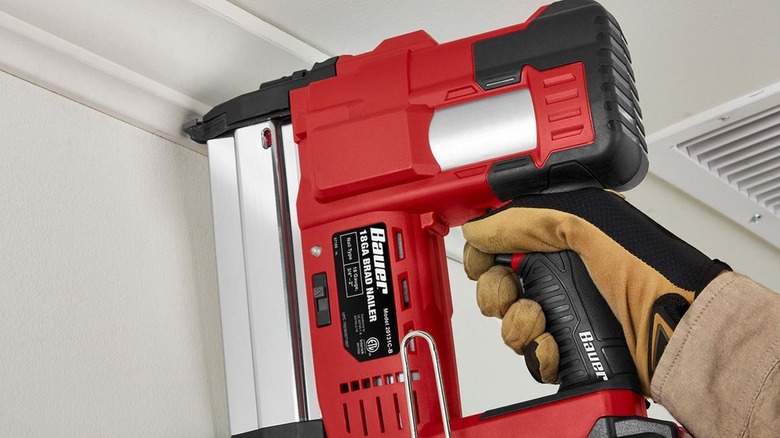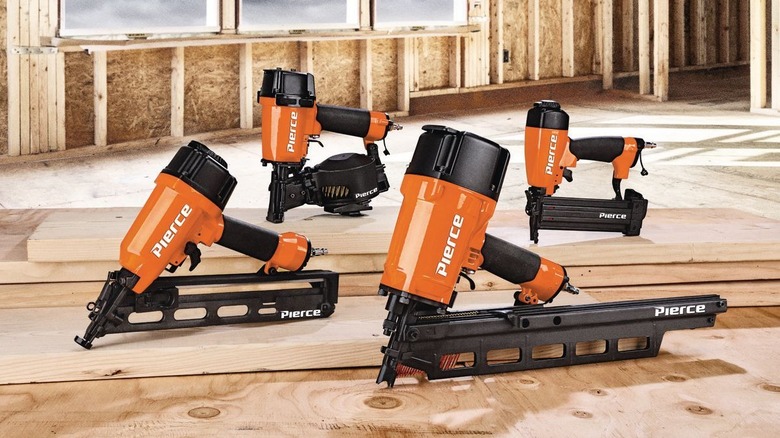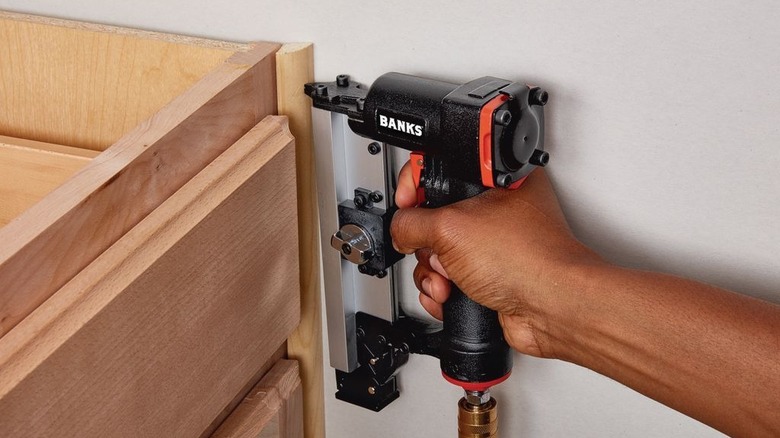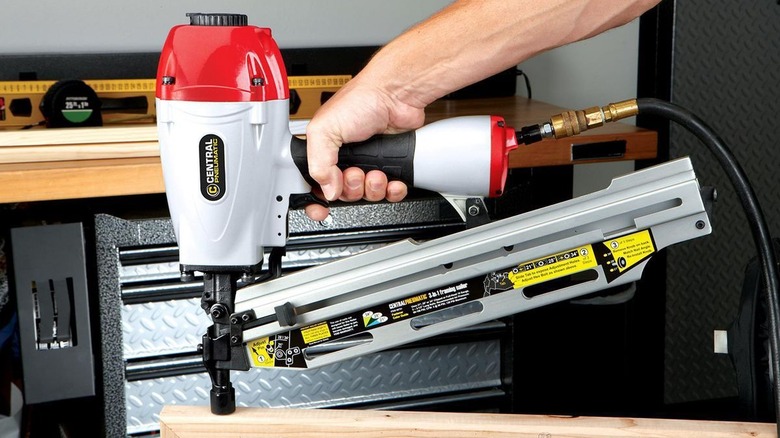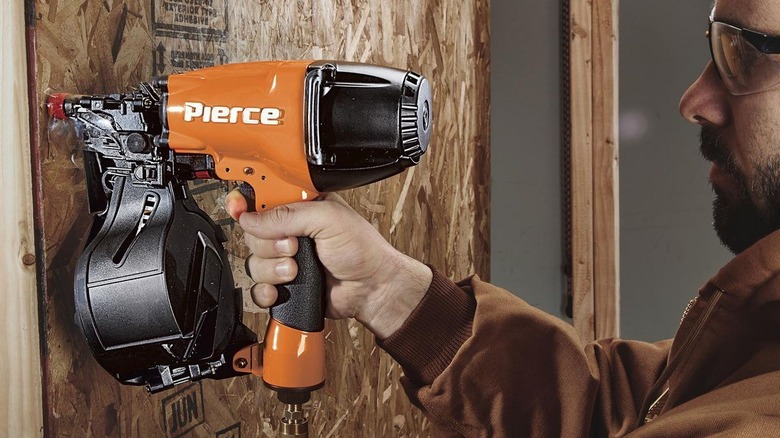Harbor Freight Nail Guns: How Many Types There Are & Which Is Best For You
When you think of driving nails into solid surfaces, you may think of positioning the nail manually with your fingers and pounding it in with a hammer. That's certainly one way to drive a nail, but depending on the kind of nails you're using, the material of the surface you're driving them into, and the location of said surface, it may not be the best way. Driving nails properly requires high levels of strength and precision, and if you're not confident in your ability to provide both with your own hands, then a better option would be to use a nail gun.
Nail guns can drive nail after nail into a work surface with laser precision at a force to be reckoned with. It's an excellent tool to have around, but before you run off to the nearest Harbor Freight to pick up the first nail gun you see, you might want to study the specific types of nail guns on offer.
Different nail guns are intended for different uses, coming in a myriad of shapes, sizes, and power levels. The Harbor Freight tool company offers quite an impressive selection of nail guns to peruse. Let's go over what kind of nail guns you can find at Harbor Freight and what kinds of purposes each one serves.
Nail gun types in general
Harbor Freight offers a nice variety of different nail guns from its in-house brands like Bauer, Central Pneumatic, Banks, and Pierce. These nail guns run the gamut of sizes and purposes, which Harbor Freight has organized into eight categories: Pin nailers, brad nailers, finish nailers, palm nailers, framing nailers, siding nailers, roofing nailers, and flooring nailers.
Each of these nailer types is intended for a different kind of job, though for the sake of convenience, we'll simplify them further into three categories of our own: Light-to-medium duty, heavy-duty, and specialty. The simple way to look at it is that if you're just building or fixing small projects or furniture in your home, a light-to-medium-duty nail gun is what you want. If you're building the actual components of a house itself, you need to go heavier.
In addition to applications, Harbor Freight's various nail guns also come in two different power types: Air and cordless. Air nailers fire off nails using compressed air, delivered via a pneumatic air tube. Obviously, you need an air compressor to use these, but their power output is nice and consistent, making them popular with professionals.
Cordless nailers, on the other hand, and powered by battery packs and built-in motors. The extra hardware does make them a little heavier, and the battery limits their active time, but the portability aspect can make up the difference depending on the kind of job you're doing.
Light-to-medium duty nail guns
A nail gun may be a powerful piece of machinery, but that doesn't mean it's only intended for industrial purposes. Smaller, more focused nail guns are ideal for small-scale D.I.Y. projects and repairs. Pin nailers fire 23-gauge headless pin nails, one of the smallest, thinnest nail types around.
These nailers are intended primarily for assembly and repairs on small things like birdhouses and cabinets, as the nails it fires are intended to be very hard to spot with a casual glance. If you want to put something together yourself but don't want it to look like you put it together yourself, get a pin nailer.
Brad nailers fire 18-gauge nails up to 2 inches long, making them good for light-duty driving and repairs. A brad nailer's work is also fairly hard to spot, but it's better suited for slightly heavier installations like trims and molding.
For the biggest installation jobs, such as baseboards and door and window trim, you'll want a finish nailer with 15- to 16-gauge nails. These nails, sunk up to 3.5 inches deep, are guaranteed to hold the various components of a home in place. However, at this size, these nails start to become more noticeable, so you might need some paint and putty to cover the holes up afterward. That's just one of the distinctive differences between brad and finish nailers.
Heavy duty nail guns
It's one thing to use nails to assemble the various components that make up the interior of your home, but if you're looking to expand outdoors, that's a separate matter. You need something a little tougher that can endure the elements while still holding everything together and looking good.
For most outdoor jobs, such as decking, framing, and fencing, you want a framing nailer. These construction-grade tools fire strip nails up to 3.5 inches deep, perfect for holding heavy pieces of lumber in place to make up a foundation or fence. This is a full-on carpentry tool and should be handled with the appropriate care and training.
As you're assembling decks and foundations, you may come across tight spots where your large framing nailer won't fit. In such a situation, you'll want to bust out the palm nailer. These compact tools can fire pretty much any nail used by other nail gun types, but they are small and simple enough to comfortably fit into your palm. The only downside is that palm nailers don't have a magazine, so you need to stick the nails into the slot one at a time.
Specialty nail guns
Light, medium, and heavy-duty nail guns are intended primarily for working with relatively softer materials like wood or drywall. However, for professional contractors building a house from scratch, those kinds of nailers won't be able to handle stronger materials like hardwood, thin metal, or masonry. It is for these very specific purposes that this trio of super-powered nailers exists.
If you're laying down a hardwood floor in a home, that's a job for a flooring nailer. This distinctive nailer has an unusual, curved shape and fires special L-shaped cleat nails . Unlike other nail guns, a flooring nailer only handles the driving part of the job; you still need to manually strike the nail head with a mallet to put the process in motion.
If you're putting up the sides of a house, that's when you call on the siding nailer. These hefty fighters sink round-head coil nails into thicker materials like shake shingles, fiber cement, and more. Technically, a framing nailer could serve this purpose as well, but a siding nailer is usually a little lighter, not to mention better for driving nails into softwood without leaving marks.
Finally, once it's time to put a proverbial bow on top of a newly-born house, that's the roof nailer's time to shine. These nailers drive special coil roofing nails up to 2 inches long. These nails are intended to secure both roof shingles and insulating materials like vinyl and tar paper. That said, heavier-duty nail guns, like framing nail guns, may be able to serve multiple purposes on any given project, depending on what needs to be done.
